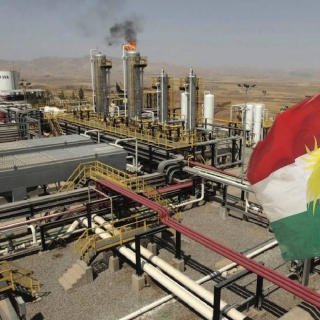


Oil prices slipped in Asia on Monday, extending losses from last week, on the prospect of a resumption of exports from Kurdistan's oilfields, while investors awaited clarity on talks to resolve Russia's war on Ukraine.
Brent futures were down 14 cents, or 0.2%, at $74.29 barrel, as of 0441 GMT, while U.S. West Texas Intermediate crude futures lost 22 cents, or 0.3%, to $70.18 a barrel.
Both Brent and WTI dropped by more than $2 on Friday, posting weekly declines of 0.4% and 0.5%, respectively.
"The downward spiral in crude oil prices is driven by pressure from the U.S. president on Iraq to resume oil exports from Kurdistan oilfields, which could improve supply flows in global oil markets after nearly two years of disruption," said Sugandha Sachdeva, founder of New Delhi-based research firm SS WealthStreet.
Iraq will export 185,000 barrels per day from Kurdistan's oilfields through the Iraq-Turkey pipeline once oil shipments resume, an Iraqi oil ministry official said on Sunday.
Iraq's oil ministry said all procedures had been completed to allow the resumption of exports through the Iraq-Turkey pipeline, potentially resolving a dispute that has disrupted crude flows.
All eyes remain on the progress of talks to end Russia's war on Ukraine, which enters its fourth year on Monday. Officials said on Sunday that European Union leaders will meet for an extraordinary summit on March 6 to discuss additional support for Ukraine and European security guarantees.
This comes after U.S. President Donald Trump initiated talks with Russia on ending the war but without inviting Ukraine or the European Union to the table. A senior Russian diplomat said Russian and U.S. teams plan to meet this week to discuss improving relations.
Sanctions by the U.S. and EU on Russian oil exports have curbed its shipments and disrupted seaborne oil supply flows. Global energy supplies are expected to increase if a peace deal is reached and sanctions are lifted.
Oil prices will be influenced by geopolitical developments and U.S. policy announcements in the short term, Sachdeva said.
In the Middle East, a Hamas official said talks with Israel through mediators on further steps in a ceasefire agreement are conditional on Palestinian prisoners being released as agreed.
Israel and Hamas have frequently accused each other of violations since the ceasefire started on January 19, but so far it has continued to hold.
Source: Investing.com
Oil prices were little changed in Asian trading on Thursday after US President Donald Trump backed down from a threat to impose tariffs on European countries over Greenland. This decision helped ease ...
Oil prices rose on Tuesday, supported by a combination of supply disruptions from Kazakhstan, improved global economic growth projections, and a weakening US dollar, making dollar-denominated oil chea...
Oil traded in a tight range on Thursday after two straight sessions of losses, as markets digested a sharper US push to shape Venezuela's crude flows—alongside fresh tanker seizures tied to sanctions....
Oil prices edged higher as the market digested the United States' latest moves regarding Venezuela. WTI held steady at US$56/barrel after a sharp drop, while Brent remained below US$60/barrel. This s...
Brent crude prices sank in volatile trading on Wednesday after U.S. President Donald Trump said Venezuela will supply tens of millions of barrels of oil to Washington. Oil prices were nursing losses ...
Gold prices briefly caused a stir after hitting a new record, but then slowed. The main trigger: US President Donald Trump withheld the threat of tariffs on Europe and claimed there was a "framework" for a future agreement on Greenland. This calmer...
Oil prices were little changed in Asian trading on Thursday after US President Donald Trump backed down from a threat to impose tariffs on European countries over Greenland. This decision helped ease geopolitical tensions and improve market...
The Nikkei 225 Index climbed 1.73% to close at 53,689, while the broader Topix Index rose 0.74% to 3,616 on Thursday, snapping a five-day losing streak as Japanese shares were lifted by a strong rally in chip and artificial intelligence related...